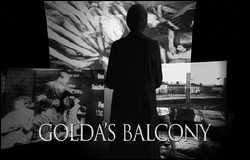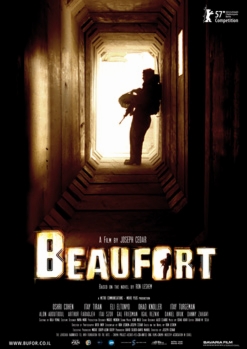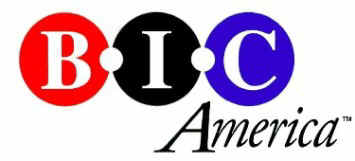 The Eighth Atlanta Jewish Film Festival continued to screen at the Regal Atlantic Station Cinemas. Through an odd coincidence of choices I made, the next two days seemed to focus on wars.
The Eighth Atlanta Jewish Film Festival continued to screen at the Regal Atlantic Station Cinemas. Through an odd coincidence of choices I made, the next two days seemed to focus on wars.![]() SIX DAYS (dir. Ilan Ziv, Israel/France/Canada, 2007, 107 mins.) is an exceptionally detailed documentary about the Six Day War, that took place in 1967, and continues to be a motivating force behind acts of terrorism. The lead up to the war is presented in all its complicated and manipulated glory, as Israeli Prime Minister Levi Eshkol, Defense Minister Moshe Dayan, Egyptian President Nasser, and Lyndon B. Johnson, and a faceless Soviet Union react and maneuver around the mere reports of movement by each other. I found the opening 30 minutes totally fascinating and relevant to the present. Once Israel makes the first strike, the film reflects the snowballing situation by speeding through the consequences. In fact, I seemed to have missed the move by Jordan, which launched Israel's offensive into Jordanian held Jerusalem. This is a HUGE clincher in the fallout of the Six Day War, as Palestine continues to hold that occupation at the heart of their opposition to the State of Israel.
SIX DAYS (dir. Ilan Ziv, Israel/France/Canada, 2007, 107 mins.) is an exceptionally detailed documentary about the Six Day War, that took place in 1967, and continues to be a motivating force behind acts of terrorism. The lead up to the war is presented in all its complicated and manipulated glory, as Israeli Prime Minister Levi Eshkol, Defense Minister Moshe Dayan, Egyptian President Nasser, and Lyndon B. Johnson, and a faceless Soviet Union react and maneuver around the mere reports of movement by each other. I found the opening 30 minutes totally fascinating and relevant to the present. Once Israel makes the first strike, the film reflects the snowballing situation by speeding through the consequences. In fact, I seemed to have missed the move by Jordan, which launched Israel's offensive into Jordanian held Jerusalem. This is a HUGE clincher in the fallout of the Six Day War, as Palestine continues to hold that occupation at the heart of their opposition to the State of Israel.
I may not be aware of, or sensitive enough to Zionism to have realized what was viewed as an anti-Israel subtext in the film's depiction of the conflict between Israel and the Palestinians. This was expressed in a post-screening discussion led by Dr. Kenneth W. Stein, Director of the Institute for the Study of Modern Israel of Emory University. I did not take copious notes, as the discussion was not related to the film itself, as much it was focussed on the world's perception of Israel's occupation of the West Bank. Stein's bottom line was that, "The state of Israel must exist as a state and has the right to take whatever actions it must to protect itself." This would not be a discussion you'd necessarily hear at the San Francisco Jewish Film Fest! Please READ THIS for a much more intelligent reflection upon the film, than I am prepared to do. My next selection would be GOLDA'S BALCONY (dir. Jeremy Kagan, US, 2007, 95 mins.) This is a bit more than a recording of Valerie Harper's brilliant performance in William Gibson's one woman play about Golda Meir. (It was performed on Broadway by Tovah Feldshuh and off-broadway and on its national tour by Valerie Harper.) In Gibson's play, Golda is telling her life story as she is facing the 1973 Yom Kippur War, where she will eventually be faced with threatening nuclear warfare in which to motivate the international community into action. During her recollections, she acts out all the characters, in what may have been a bit confusing on stage, it is much clearer in the film, as she plays against herself in video effects. The script was presented 99% intact, as she explained, during the Q&A.
My next selection would be GOLDA'S BALCONY (dir. Jeremy Kagan, US, 2007, 95 mins.) This is a bit more than a recording of Valerie Harper's brilliant performance in William Gibson's one woman play about Golda Meir. (It was performed on Broadway by Tovah Feldshuh and off-broadway and on its national tour by Valerie Harper.) In Gibson's play, Golda is telling her life story as she is facing the 1973 Yom Kippur War, where she will eventually be faced with threatening nuclear warfare in which to motivate the international community into action. During her recollections, she acts out all the characters, in what may have been a bit confusing on stage, it is much clearer in the film, as she plays against herself in video effects. The script was presented 99% intact, as she explained, during the Q&A.
Harper's performance is simply fabulous. There is no sign of "Rhoda", much less Harper.  Her work on the characterization on stage is wonderfully transferred to the screen. The make-up effects are extraordinary, as well. It was a daily three and a half hour transformation. In fact, as she arrived in the theater for the screening and subsequent Q&A, she was simply gorgeous and nearly unrecognizable from any of her previous performances. (I'm afraid I was not in a great spot to snag any GOOD photos.)
Her work on the characterization on stage is wonderfully transferred to the screen. The make-up effects are extraordinary, as well. It was a daily three and a half hour transformation. In fact, as she arrived in the theater for the screening and subsequent Q&A, she was simply gorgeous and nearly unrecognizable from any of her previous performances. (I'm afraid I was not in a great spot to snag any GOOD photos.)  The only real cinematic effects that director Kagan gave it was that the entirety was shot against a green screen, so that a montage of clips, images and paintings are used for settings. It is actually an adaption of the rear screen projections that were used on stage.
The only real cinematic effects that director Kagan gave it was that the entirety was shot against a green screen, so that a montage of clips, images and paintings are used for settings. It is actually an adaption of the rear screen projections that were used on stage. 
 Valerie Harper also remarked on the "feeling of party, community and family" that she was experiencing at the Atlanta Jewish Film Festival. A feeling that I can completely validate! I have yet to go on one of my typical diatribes about festival mismanagement, since this festival is so polished and organized! Even the pre-screening titles are a relatively beautiful presentation of the festival calendar and sponsor credits. The seating announcement, or as is being jokingly referred to as "the voice of god", is a fabulous, professional and incredibly efficient way to get the programs started! The speakers have all been quite energetic and enthusiastic. Well, with just one exception, so far...
Valerie Harper also remarked on the "feeling of party, community and family" that she was experiencing at the Atlanta Jewish Film Festival. A feeling that I can completely validate! I have yet to go on one of my typical diatribes about festival mismanagement, since this festival is so polished and organized! Even the pre-screening titles are a relatively beautiful presentation of the festival calendar and sponsor credits. The seating announcement, or as is being jokingly referred to as "the voice of god", is a fabulous, professional and incredibly efficient way to get the programs started! The speakers have all been quite energetic and enthusiastic. Well, with just one exception, so far... BEAUFORT (dir. Joseph Cedar, Israel, 2007, 125 mins.) I did not catch the name of the man who introduced the film (the program lists former IDF Commander, Uri Rosenheck), however he lacked any real enthusiasm for the program and basically gave a small lecture on the authenticity of the production. "I hope you enjoy what is a very interesting film." Hmmm. Interesting? BEAUFORT is Israel's submission for the Foreign Language Oscar this year, and as of today, it is on the short list. (Nominations will be announced Monday morning!) So, I think "interesting" should have been an understatement. What followed was a near minimalist observation of the final days of a military unit's occupation of Beaufort Castle, in Lebanon. The widescreen cinematography is not to capture the spectacle of warfare, but to reinforce the monotony of being stationed at a lookout post. The emotional impact of the film rests on the apparent futility of that function, as the unit knows that a withdrawal is imminent, as well as the lives that are lost during those last few days. This is where I found the screenplay a bit cliched as each tragedy is foreshadowed by having the victim have a "when I go home" moment. ("I am only three days from kissing Michele!" Guess what...) However, the overall bleak sense of helplessness and demoralization that fills the film, is commendably achieved, though not necessarily entertaining.
BEAUFORT (dir. Joseph Cedar, Israel, 2007, 125 mins.) I did not catch the name of the man who introduced the film (the program lists former IDF Commander, Uri Rosenheck), however he lacked any real enthusiasm for the program and basically gave a small lecture on the authenticity of the production. "I hope you enjoy what is a very interesting film." Hmmm. Interesting? BEAUFORT is Israel's submission for the Foreign Language Oscar this year, and as of today, it is on the short list. (Nominations will be announced Monday morning!) So, I think "interesting" should have been an understatement. What followed was a near minimalist observation of the final days of a military unit's occupation of Beaufort Castle, in Lebanon. The widescreen cinematography is not to capture the spectacle of warfare, but to reinforce the monotony of being stationed at a lookout post. The emotional impact of the film rests on the apparent futility of that function, as the unit knows that a withdrawal is imminent, as well as the lives that are lost during those last few days. This is where I found the screenplay a bit cliched as each tragedy is foreshadowed by having the victim have a "when I go home" moment. ("I am only three days from kissing Michele!" Guess what...) However, the overall bleak sense of helplessness and demoralization that fills the film, is commendably achieved, though not necessarily entertaining. Maxxxxx says
Maxxxxx says
re SIX DAYS: "Cranky bird!"
re GOLDA'S BALCONY: "Wooooo!"
re BEAUFORT: "Is it bedtime?"
Sunday, January 20, 2008
2008 Atlanta Jewish Film Festival - Days 3 and 4, and 6 Day War and More
Category:
Film Festivals,
Movies
Subscribe to:
Post Comments (Atom)



















 Pseudomyxoma Peritonei (Huh???)
Pseudomyxoma Peritonei (Huh???) Fluidtoons! By Brett W. Thompson!
Fluidtoons! By Brett W. Thompson!
 THE EVENING CLASS (by Michael Guillen)
THE EVENING CLASS (by Michael Guillen) Television Without Pity!
Television Without Pity! John Rutherford's Blog for COLT Studio Group
John Rutherford's Blog for COLT Studio Group



No comments:
Post a Comment